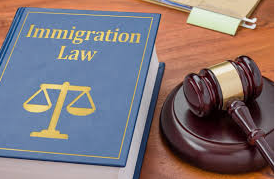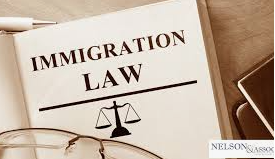Introduction to Immigration Law in 2025
Immigration law in the United States is constantly evolving, with new regulations and policies introduced regularly. In 2025, staying informed about these changes is essential for anyone navigating the immigration process. Whether you are seeking a visa, applying for permanent residency, or addressing legal issues related to deportation, understanding the current legal environment is key to protecting your rights and achieving your goals. The increasing complexity of immigration cases highlights the importance of securing professional legal support. As the number of applicants rises and policies become more intricate, individuals may face challenges that require expert guidance to address effectively.

Researching Potential Lawyers
When searching for an immigration lawyer, it’s important to utilize various resources to identify skilled professionals. Begin by exploring online platforms that provide client reviews and ratings. These reviews can reveal patterns in how attorneys interact with clients and handle cases. Pay attention to both positive and negative feedback to get a balanced understanding of their reputation. Another useful resource is word-of-mouth recommendations. Reach out to friends, family, or colleagues who have dealt with immigration matters to see if they can suggest someone they trusted. Personal referrals can often provide valuable insights into the attorney’s professionalism and effectiveness.
Additionally, consider using online directories specifically designed to connect individuals with legal professionals. Platforms such as the American Immigration Lawyers Association (AILA) directory allow you to filter results based on your location and the specific legal services you need. These directories often include detailed profiles outlining an attorney’s areas of expertise, years of experience, and professional affiliations. Some even provide links to the lawyer’s website or contact information to make the next steps easier. Another key aspect of your research should involve confirming that the attorney is licensed and in good standing with their state bar association. Many state bar websites offer free online tools to verify a lawyer’s credentials and disciplinary history, helping ensure they meet professional standards.
As you research, focus on attorneys with experience in cases similar to yours. For example, if you’re seeking help with employment-based visas, prioritize lawyers who specialize in that area. Narrowing your search to those with relevant experience can increase the likelihood of achieving a favorable outcome. Beyond their specialization, look for lawyers who demonstrate a commitment to staying current with changing immigration laws and policies. Membership in legal organizations, attendance at industry conferences, and a track record of continuing education are indicators of a lawyer who remains informed and prepared to address new challenges.

Finally, pay attention to any free resources or informational materials attorneys may offer on their websites, such as blogs, guides, or frequently asked questions. These materials can provide helpful background knowledge while also reflecting the lawyer’s dedication to educating and assisting their clients. Taking the time to explore these resources not only builds your understanding of immigration law but also gives you an idea of the lawyer’s communication style and expertise.
Evaluating Lawyer Credentials
To assess a lawyer’s ability to handle your case, start by examining their educational background and any additional training they have completed in immigration law. While all licensed attorneys meet a baseline requirement to practice law, specialized training or coursework in immigration can indicate a deeper understanding of the field. Lawyers who have pursued continuing education or certifications specific to immigration law are often better equipped to address the nuances of these cases.
Membership in professional organizations, such as the American Immigration Lawyers Association (AILA), is another indicator of a lawyer’s commitment to their practice. These memberships often require adherence to strict professional standards and provide attorneys with access to resources that keep them informed about legislative updates and policy changes. Additionally, involvement in such organizations may reflect the lawyer’s dedication to staying engaged with developments in immigration law.
Another aspect to evaluate is the attorney’s track record in handling cases similar to yours. For example, if you need help with a family-based immigration petition, verify whether the lawyer has prior experience managing these types of cases successfully. Reviewing case outcomes, when available, can help you gauge their effectiveness and ability to navigate complex scenarios. Similarly, consider the size and scope of the law firm where the attorney works. Smaller firms may offer more personalized attention, while larger firms could have greater resources and diverse expertise.

Don’t overlook the importance of the attorney’s standing with their state bar association. Each state maintains records on disciplinary actions or complaints against attorneys, which can help you avoid professionals with a history of unethical behavior or subpar performance. Many state bar websites allow you to search these records easily, ensuring transparency in the lawyer’s professional history.
Finally, evaluate the lawyer’s accessibility and approach to client service. A strong legal professional will prioritize clear communication, prompt responses, and regular updates on the progress of your case. While credentials and experience are critical, an attorney’s ability to work collaboratively and build trust is equally significant in determining whether they are the right fit for your needs.
Consultation and Communication
Meeting with potential attorneys provides a chance to assess their ability to handle your case and address your concerns. During these discussions, it’s important to observe how effectively the lawyer engages with you and whether they focus on your specific needs. A lawyer who asks relevant questions about your situation and takes time to understand the details of your case demonstrates a client-centered approach. This not only reflects their commitment to providing tailored legal assistance but also helps ensure your concerns are fully addressed.
When discussing your case, note how well the attorney explains legal processes and options. Immigration law can be complicated, and a good lawyer will break down complex information into terms that are easy to understand. They should also be open to answering follow-up questions and providing clarity on aspects of your case that may be unclear. Attorneys who are transparent about their strategies and the possible challenges ahead help build trust and ensure that you have realistic expectations about the process.
It’s also important to assess how organized and professional the attorney appears during the consultation. Pay attention to how promptly they respond to your inquiries and how they manage your time during the meeting. An attorney who demonstrates efficiency and respect for your schedule is more likely to handle your case with care and attention. Additionally, consider whether the lawyer provides clear next steps for moving forward. This could include outlining the documents needed, potential timelines, or an overview of how they will approach your case.
Throughout the consultation, evaluate the attorney’s communication style and whether it aligns with your preferences. Some clients may value frequent updates and detailed explanations, while others may prefer concise, high-level communication. Ensuring that your preferred approach is compatible with the lawyer’s style can reduce misunderstandings and improve collaboration.

Finally, consider the atmosphere of the consultation itself. Does the lawyer seem approachable and respectful? Are they patient when discussing your concerns? A professional yet personable interaction can indicate the attorney’s ability to create a supportive working relationship.
Assessing Costs and Fees
When discussing costs with immigration lawyers, it’s essential to gain a clear understanding of their fee structures and what services are included. Some attorneys charge a flat fee for specific services, such as filing a visa application or preparing a petition, while others work on an hourly rate. Flat fees can offer predictability, particularly for straightforward cases, whereas hourly rates might apply to more complex situations that require additional time and effort. During your consultation, ask for a detailed explanation of how the lawyer calculates their fees and what expenses might arise during the course of your case.
In addition to understanding the fee structure, inquire about any additional costs that may not be immediately apparent. For example, you may encounter separate charges for filing fees, document translations, or courier services. Make sure to ask whether these costs are included in the quoted price or if they will be billed separately. Transparency about these details can help you avoid unexpected financial surprises later in the process.
It’s also a good idea to ask about payment plans or financing options if you’re concerned about covering legal costs upfront. Some lawyers offer flexible payment schedules to accommodate clients who may not be able to pay the full amount immediately. This can be particularly helpful if your case is expected to take an extended period to resolve. Clarifying these options early on can make the financial aspect of working with an attorney more manageable.

Comparing the fees of multiple lawyers is an important step, but it’s equally critical to evaluate the level of service provided for the cost. A lower fee may initially seem appealing, but it’s important to weigh whether that lawyer has the experience, resources, and communication style necessary to handle your case effectively. On the other hand, higher fees don’t always guarantee better service, so it’s essential to review all aspects of the attorney’s qualifications and approach before making a decision.
When reviewing cost estimates, don’t hesitate to request a written agreement outlining the terms of payment and services provided. A clear agreement helps ensure that both you and the attorney are on the same page regarding expectations and reduces the likelihood of misunderstandings. Additionally, be cautious of lawyers who are unwilling to provide transparent information about their fees or who seem overly focused on securing payment without discussing the specifics of your case. Transparency and professionalism are key indicators of a trustworthy legal professional.
Making the Final Decision
Once you have gathered and evaluated all the necessary details about potential attorneys, it’s important to take a moment to reflect on how each lawyer aligns with your needs and priorities. Consider the specific qualifications and expertise they bring to the table, particularly in relation to the type of immigration case you are pursuing. An attorney with direct experience in handling similar cases is more likely to anticipate challenges and develop strategies tailored to your situation.
Think about how well each attorney communicated during your consultation. Were they able to clearly explain the process and answer your questions in a way that made you feel informed? Effective communication is a vital quality in an attorney, as it ensures you stay updated and understand each step of the process. If you felt at ease discussing your case with them, it could be a sign of a positive working relationship moving forward.
Additionally, take note of their level of responsiveness and professionalism. How quickly did they return your messages or provide the information you requested? These factors can give you a sense of how attentive they will be as your case progresses. An attorney who respects your time and makes an effort to address your concerns promptly can be a valuable partner in navigating the complexities of immigration law.

When reviewing costs, focus not just on the price but on the overall value each attorney offers. While affordability is an important consideration, make sure the lawyer you choose provides the level of service, expertise, and dedication necessary to handle your case effectively. Compare fee structures and ensure you are comfortable with the terms of payment and any additional costs involved.
Finally, assess how comfortable you feel working with the attorney. Trust and confidence in their abilities are key to building a strong partnership. If you believe the lawyer understands your goals and is genuinely committed to achieving the best outcome, they are likely a good fit for your needs. Take your time to weigh all factors carefully before making your decision.